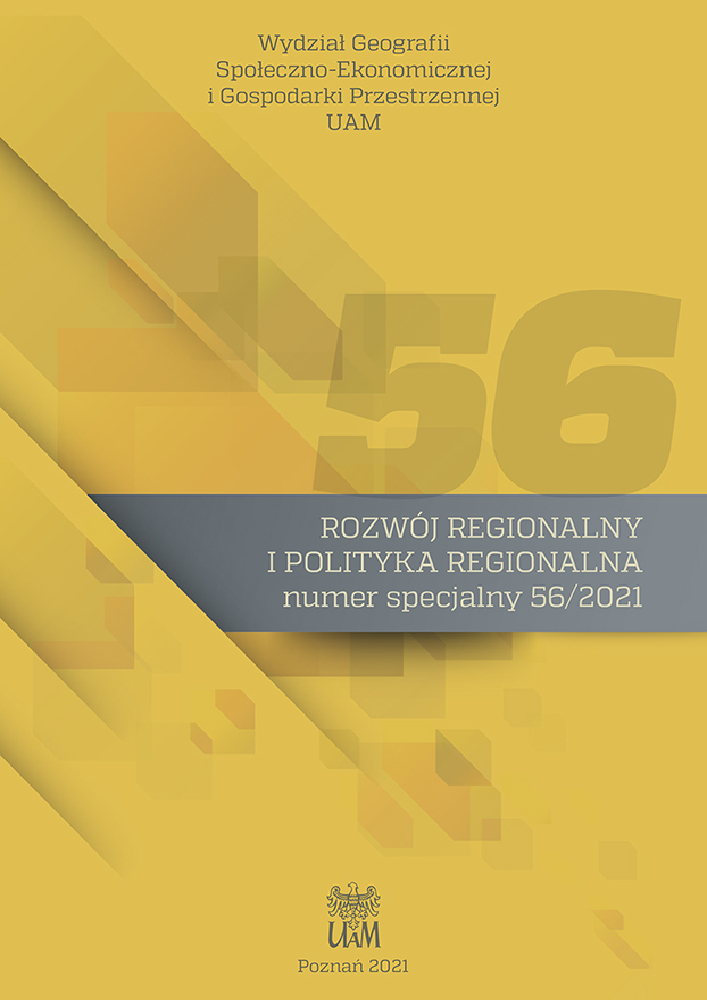Abstrakt
Przedmiotem artykułu są zmiany zachodzące w badaniach nad przestrzeniami kulturowymi wywołane kryzysem teoriopoznawczym w obszarze badań nad kulturą i przebiegające równolegle z dyskusjami dotyczącymi nowych teorii miejskich. W artykule postawiono cztery tezy: 1) nauka poznaje i performuje przestrzenie; 2) studia kulturowe rozwijają zwrot przestrzenny, zwrot topograficzny i zwrot geograficzny; 3) zwrot przestrzenny uaktywnia pułapki w badaniach transdziedzinowych; 4) urbanizacja jest planetarną praktyką kulturalizacji przestrzeni. Wychodząc z założenia, że przestrzeń stanowi nie tylko przedmiot poznania, lecz także konstrukt badań naukowych (zwroty: przestrzenny, geograficzny, topograficzny i ekologiczny), poszukuje się odpowiedzi na pytanie, jakie miejsce zajmują czynniki i przestrzenie kulturowe w nowych epistemologiach miejskości.
Bibliografia
Amin A., Graham S. 1997. The oridinary city. Transactions of the institute of British Geographers, 22: 411–429.
Bachmann-Medick D. 2012. Cultural Turns. Nowe kierunki w naukach o kulturze. Przeł. K. Krzemie niowa. Oficyna Wydawnicza, Warszawa.
Bailey L. 1989. The skull’s darkroom: the camera obscura and subjectivity. [W:] Philosophy of Tech nology. Kluwer Academic Publishers, Dordrecht.
Brenner N., Schmid Ch. 2014. The ‘Urban Age’ in Question. International Journal of Urban and Regional Studies.
Brenner N., Schmid Ch. 2015. Towards a new epistemology of the urban? City, 19, 2–3.
Clark T.N. (red.) 2011. The City as an Entertainment Machine. Lexinghton Books, Langham.
Colemen R., Ringrose J. (red.) 2013. Deleuze and research Methodologies. Edinburgh University Press, Edinburgh.
Farias I. 2011. The politics of urban assemblages. City, 15: 365–374.
Farias I., Bender T. (red.) 2010. Urban Assemblages: How Actor-network Theory Changes Urban Theory. Routledge, London.
Hall E. 1976. Ukryty wymiar. Przeł. T. Hołówka. PIW, Warszawa.
Hall G., Birchall C. 2006. New Cultural Studies. Adventures in Theory. The University of Georgia Press, Athens.
Ingold T. 2021. Correspondences. Polity, Cambridge, Medford.
Jackson P. 1989. Maps of Meaning. An Introduction to Cultural Geography. Routledge, London, New York.
Latour B. 2010. Splatając na nowo to, co społeczne. Wprowadzenie do teorii aktora-sieci. Przeł. A. Derra, K. Abriszewski. Universitas, Kraków.
Latour B., Voolgar S. 2020. Życie laboratoryjne. Konstruowanie faktów naukowych. NCK, Warszawa. Law J. 2004. After Method. Mess in Social Science Research. Routledge, London, New York.
Lévi-Strauss C. 1969. Myśl nieoswojona. Przeł. A. Zajączkowski. PWN, Warszawa.
L-w M., Knoblauch H. 2020. Dancing in Quarantine: The Spatial Reconfiguration of Society and the Interaction Orders. Space and Culture, 23, 3.
Lury C. 2021. Problem Spaces: How and Why Methodology Matters. Polity.
Lury C., Wakeford N. 2012. Inverntive Methods. The Happening of the Social. Routledge, London, New York.
Massey D. 2005. For Space. SAGE Publications, Los Angeles, London, New Delhi.
McFarlane C. 2011. Lerning the City: Knowledge and Translocal Assemblage. Wiley Blackwell, Oxford.
McFarlane C. 2015. Assemblage and critical urban theory. City, 204–2024.
Murdoch J. 2006. Post-Structuralist Geography. SAGE Publications, London, Thousand Oaks, New Delhi.
Rewers E. 2013. The Contradictions of Urban Art. Contrasting Models of Critical Consciousness. Lit Verlag, Vien, Berlin.
Rewers E. 2014. Miejska przestrzeń kulturowa: od laboratorium do warsztatu. [W:] E. Rewers (red.), Kulturowe studia miejskie. Narodowe Centrum Kultury, Warszawa, s. 21–65.
Rewers E. 2019. Odwrócona ekonomia symboliczna protestu. Przegląd Kulturoznawczy, 3: 253–270. Rodaway P. 1994. Sensuous Geographies. Body, sense and place. Routledge, London, New York.
Rorty R.M. 1967. The Linguistic Turn. The University of Chicago Press, Chicago.
Ryan M. (red.) 2008. Cultural Studies. An Anthology. Blackwell, Malden, Oxford, Carlto.
Rybicka E. 2014. Geopoetyka. Przestrzeń i miejsce we współczesnych teoriach i praktykach literackich. Universitas, Kraków.
Said E. 2008. Kultura i imperializm. Przeł. M. Wyrwas-Wiśniewska. Wydawnictwo UJ, Kraków. Serres M. 1983. Hermès. Literature, Science, Philosophy. The Johns Hopkins University Press, Baltimore, London.
Shields R., Schillmeier M., Lloyd J., van Loon J. 2020. 6 Feet apart. Spaces and Cultures of Quarantine. Space and Culture, 23, 3.
Smith P., Riley, A. 2009. Cultural Theory. An Introduction. Blackwell, Malden, Oxford.
Soja E.W. 1996. Thirdspace. Journeys to Los Angeles and other Real-and-Imagined Places. Blackwell, Malden, Oxford, Carlton.
Soja E.W., Kanai M. 2006. The urbanisation of the world. [W:] R. Burdett, D. Sudjic (red.), The endless city. Phaidon, London.
De Sousa Santos B. 2007. Another Knowledge is possible. Beyond Nothern Epistemologies. Verso, London.
De Sousa Santos B. 2018. The End of Cognitive Empire: The Coming of Age of Epistemologies of the South. Duke University Press Books, Durham, North Carolina.
Stewart K. 2007. Ordinary Affects. Duke University Press, Durham, London.
Streule M. 2020. Doing mobile ethnography: Grounded, situated and comparative. Urban Studies, 57(2): 421–438.
Stroper M., Scott A.J. 2016. Curent debates in urban theory: A critical assessment. Urban Studies. Thrift N. 2000. Introduction. [W:] M. Crang, N. Thrift (red.), Thinking Space: Critical Geographies. Routledge, London, New York.
Wallis A. 1966. Przestrzenny układ kultury. Kultura i Społeczeństwo, 4. Wallis A. 1969. Warszawa i przestrzenny układ kultury. PWN, Warszawa.
Wallis A. 1979. Informacja i gwar. O miejskim centrum. PIW, Warszawa.
Licencja
Prawa autorskie (c) 2021 Ewa Rewers

Utwór dostępny jest na licencji Creative Commons Uznanie autorstwa 4.0 Międzynarodowe.

